外研英语必修3 The Violence of Nature Grammar过去完成时和间接引语课件(共38张PPT)
文档属性
| 名称 | 外研英语必修3 The Violence of Nature Grammar过去完成时和间接引语课件(共38张PPT) |  | |
| 格式 | zip | ||
| 文件大小 | 1.8MB | ||
| 资源类型 | 教案 | ||
| 版本资源 | 外研版 | ||
| 科目 | 英语 | ||
| 更新时间 | 2020-04-05 17:06:06 | ||
图片预览


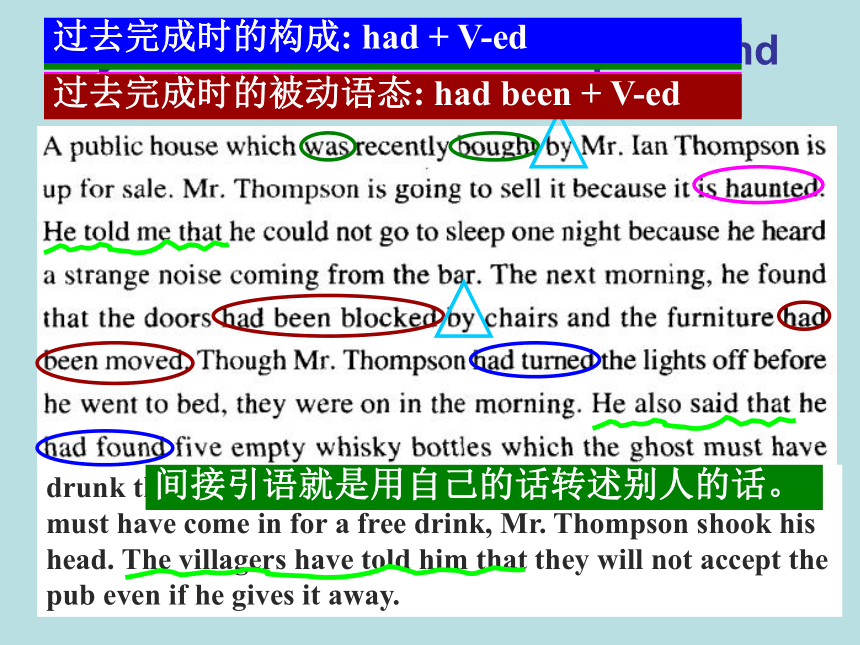

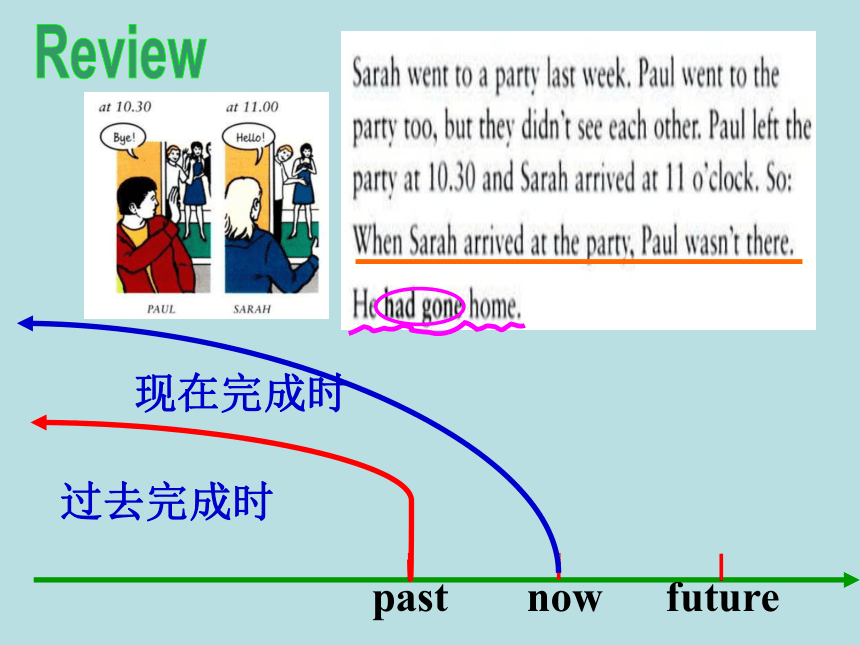
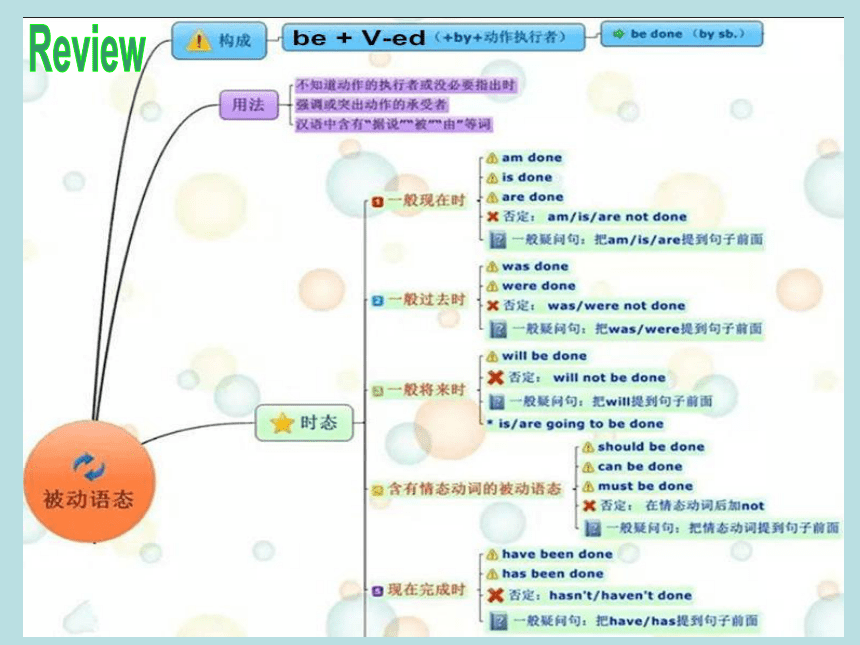
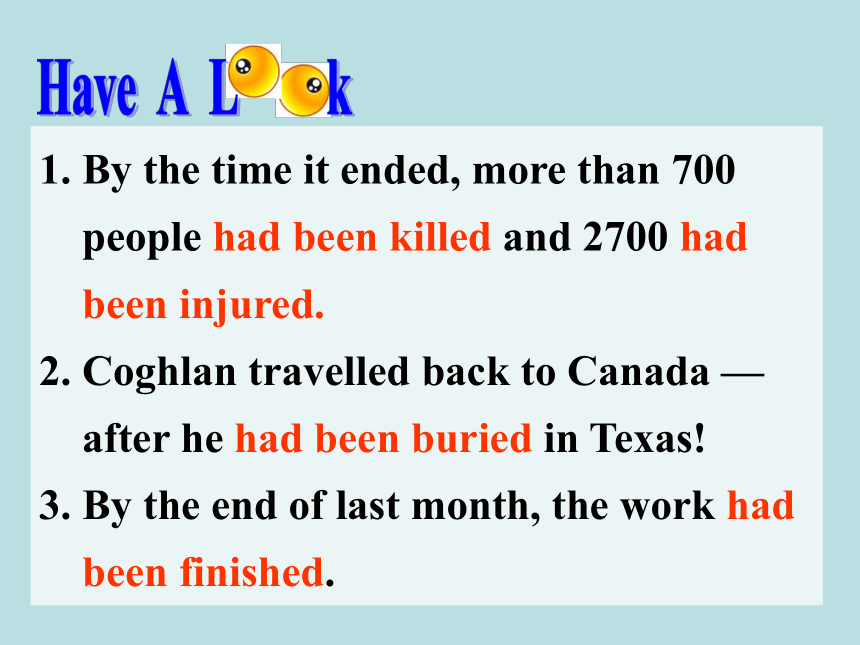



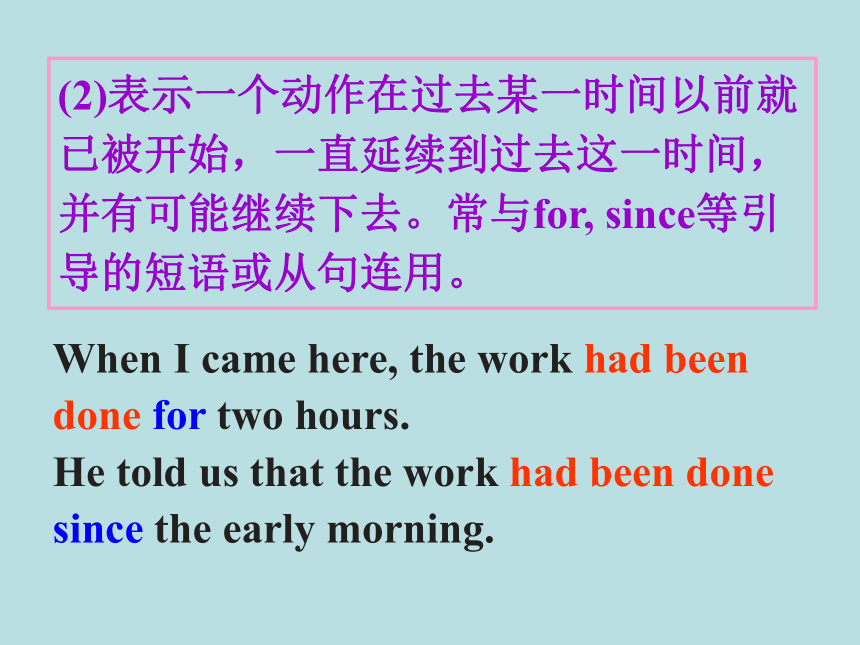
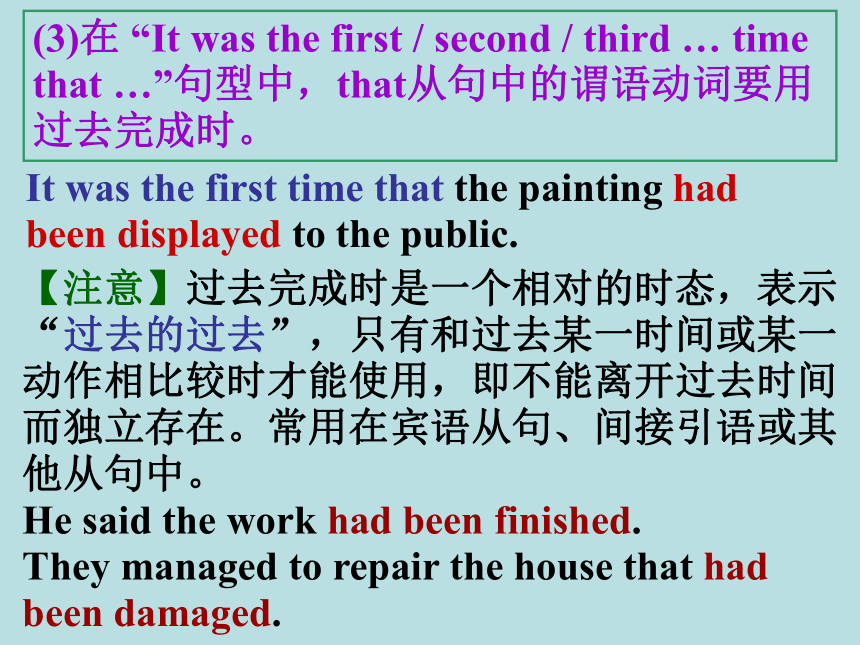
文档简介
(共38张PPT)
Module 3
The Violence of Nature
P4
Grammar
Objectives
1. To learn the use of the past perfect
passive
2. To learn the use of indirect speech
Pay attention to the circled parts and get the structure they use.
drunk the night before. When I suggested that some villagers must have come in for a free drink, Mr. Thompson shook his head. The villagers have told him that they will not accept the pub even if he gives it away.
一般现在时的被动语态: am / is / are + V-ed
一般过去时的被动语态: was / were + V-ed
过去完成时的被动语态: had been + V-ed
过去完成时的构成: had + V-ed
间接引语就是用自己的话转述别人的话。
Grammar 1
now
past
future
过去完成时
现在完成时
By the time it ended, more than 700
people had been killed and 2700 had
been injured.
2. Coghlan travelled back to Canada —
after he had been buried in Texas!
3. By the end of last month, the work had
been finished.
4. The boy was reminded that his
homework had not been handed in.
5. The work was done earlier than it had
been planned.
6. As soon as their homework had been
assigned, they started to do it.
7. They left after the door had been locked.
过去完成时的被动语态有以下三种形式:
(1)肯定结构:
主语+had been done+其他成分
(2)否定结构:
主语+had not been done+其他成分
(3)疑问句结构:
had+主语+been done+其他成分
过去完成时的被动语态常用于以下情况:
By the time he got to the school, the first period had been finished.
The classroom hadn’t been cleaned before the teacher came.
How many buildings had been destroyed when the hurricane ended?
Had the experiment been finished by 4 o’clock yesterday afternoon?
(1)表示一个动作在过去某一时间或某一动
作之前就已被完成。常与by, before等引导的时间状语连用。
(2)表示一个动作在过去某一时间以前就已被开始,一直延续到过去这一时间,并有可能继续下去。常与for, since等引导的短语或从句连用。
When I came here, the work had been done for two hours. He told us that the work had been done since the early morning.
(3)在 “It was the first / second / third … time that …”句型中,that从句中的谓语动词要用过去完成时。
It was the first time that the painting had been displayed to the public.
【注意】过去完成时是一个相对的时态,表示“过去的过去”,只有和过去某一时间或某一动作相比较时才能使用,即不能离开过去时间而独立存在。常用在宾语从句、间接引语或其他从句中。
He said the work had been finished. They managed to repair the house that had been damaged.
1. 他到学校的时候,第一节课已经上完了。
By the time he got to the school, the
first period ________________.
2. 他们说生产成本已经降低。
They said the production costs
_________________.
3. 这个建筑我六岁就建好了。
The?building _____________ when I was 6.
4. 会前已经讨论了新计划吗?
_____ the new plan _____________
before the meeting?
had been finished
had been reduced
had been built
Had been discussed
P24 2
Choose the correct tense and voice to complete each sentence.
saw
had disappeared
returned
found
had been ruined
arrived
had taken
left
had finished
tried
passed
P24 3
1. After the earthquake, they discovered that
several people __________________.
2. When the hurricane ended, several
buildings in the town ________________.
3. His village _____________ in the heavy
rain, so he moved to his parents’ house.
4. When she woke up, she found that her
house _____________ by the thunderstorm.
5. Arthur was unhappy because some of his
animals __________________.
destroy die fall flood kill
had been killed/ had died
had been destroyed/ had fallen down
had been flooded/ had been destroyed
had been destroyed
had been killed/ had died
Complete these sentences with the verbs from the box. Use the past perfect passive, if necessary.
Grammar 2
The definitions of direct speech and indirect speech:
一字不改地引述别人的话,叫_________;
直接引语
说话人用自己的话转述别人的话,叫 _________。
间接引语
直接引语通常都用_________括起来,
引号 “ ”
间接引语在多数情况下都构成一个 ________。
宾语从句
Examples from our textbooks:
1. He said that he was still working
because there was a lot to do.
2. He said that eleven thousand people
lived there and six thousand had left the
week before.
3. He asked if this meant that the danger
was over.
4. He said that they couldn’t go back to
their houses.
5. The reporter asked when people
would be able to return home.
Change what has been said to an object clause or an infinitive
phrase
He said, ‘I’m used to such embarrassing comments.’
He said that he was used to such embarrassing comments.
‘We must not give up in the face of pressure!’ she said.
She encouraged us not to give up in the face of pressure.
He said, ‘I like it very much.’
He said that he liked it very much.
He said to me, ‘I’ve left my book in your room.’
He told me that he had left his book in my room.
Change personal pronouns:
I said to her, ‘I have done my best.’
I told her that I had done my best.
Past continuous
Past perfect
Future in the past
Past perfect
The changes of the tenses
Simple past
Past perfect
Direct speech Indirect speech Direct speech Indirect speech
Simple present Simple future
Present continuous Present perfect
Simple past Past perfect
He said, ‘I lost a key here yesterday.’
He said that he had lost a key there the
day before/the previous day.
‘I read the book here a week ago,’ Jane said to him.
Jane told him that she had read the book there a week before/earlier.
Change adverbials of time
and place
Direct speech Indirect speech
now then
today that day/on Saturday, etc.
tonight that night
tomorrow the next day/the following day/on Tuesday, etc.
yesterday the day before/the previous day/on Tuesday, etc.
next week the next/following week, etc.
last year the year before/the previous year, etc.
a week ago a week before/a week earlier, etc.
Other cases
Direct speech Indirect speech
this that
these those
here there
come go
bring take
She said, ‘I’ll come here again tonight.’
She said she would go there again that night.
He said, ‘I want this.’
He said that he wanted that.
May said to Tom, ‘I’ll bring some photos here to you tomorrow.’
May told Tom she would take some photos there to him the next day.
由直接引语转变为间接引语,下列情况时态不变:
1. 转述的内容是不变的真理:
The teacher said to the students, ‘Water freezes when the temperature falls below 0℃.’
→ The teacher told the students that water freezes when the temperature falls below 0℃.
2. 转述的内容指经常的习惯:
He said to the doctor, ‘I smoke two packs every day.’
→ He told the doctor that he smokes two packs every day.
3. 转述历史事件:
The teacher said, ‘World War II ended in 1945.’
→ The teacher said that World War II ended in 1945.
4. 部分情态动词,如must, ought to, used to, had better等:
She said to me: ‘You must hurry up.’
→ She said that I must hurry up.
陈述句:
Use noun clauses introduced by that to
report statements. ‘That’ can be omitted.
‘I don’t like computers,’ Sarah said to her friends.
Sarah said to her friends
that
I don’t like
computers.
told
didn’t
she
Sarah told her friends that she didn’t like computers.
Ted said (that) there wasn’t any trouble and that he was waiting for his change.
注意: 当两个或两个以上的宾语从句并列时, 仅能省略第一个that, 其余的不能省略。
Ted said, ‘There isn’t any trouble and
I’m waiting for my change (零钱).’
Is it easy to improve the condition of the soil?
( They asked him )
They asked him
if
It is easy to improve the condition of the soil.
it is easy to improve the condition of the soil.
asked
is
was
They asked him if it was easy to improve the condition of the soil.
2. 一般疑问句:
Use noun clauses introduced by whether/if to report yes/no questions.
When do you harvest the wheat?
( They asked him )
They asked him
when
you harvest the wheat
you harvest the wheat.
he
harvested
They asked him when he harvested the wheat.
harvested
3. 特殊疑问句:
Use noun clauses introduced by wh-words to report wh-questions.
To report imperative sentences, we use the
structure:
reporting verb + object + (not) + to-infinitive
‘Don’t worry, Mickey,’ Jen said.
Jen asked Mickey not to worry.
*other verbs can be used in this structure
‘Don’t believe every ad you read,’ Lily said to
me.
Lily advised me not to believe every ad I read.
reporting verb
object
(not)
to-infinitive
advise encourage invite recommend warn
4. 祈使句:
P26 2
Rewrite the sentences using the reporting expressions.
1. Volcanic eruptions don’t happen very often on the island.
A scientist said that __________________
_____________________________________.
2. No one was on the island during the volcanic eruptions.
A local journalist said that ____________
_____________________________________
_____________________________________.
volcanic eruptions didn’t happen very often on the island
no one was/
had been on the island during the volcanic eruptions.
3. The thunderstorm will put out the fires.
Local people said that _________________
______________________________________.
4. The residents can go back to their homes.
The governor said that _________________
______________________________________.
5. Several eruptions have taken place in the last twenty years.
A local radio station said that ______________
_______________________________________.
6. The residents will travel back to the island when the danger is over.
A local journalist said that ________________
_________________________________________.
the thunderstorm would put out the fires
the residents could go back to their homes
several eruptions had taken place in the previous twenty years
the residents would travel back to the island when the danger was over
IV. 完成句子(每空一词)。 1. He said this book ______ ______ ___________ into Japanese and it was worth reading. 他说这本书已被译成日语,值得一读。 2. How many English songs ____ ____ _____________
by the end of last term? 到上学期末你们学了几首英文歌? 3. The children _____ ______ asleep before the
performance ended. 演出还没有结束, 孩子们就睡着了。 4. He was amazed at the great changes that ______ ______ ________ in his hometown. 他对他家乡发生的巨变感到十分惊讶。 5. The vegetables didn’t taste very good. They ______ _______ ________ too long. 这些蔬菜尝起来不太好吃。煮的时间太长了。
had been translated
had you learned / learnt
had fallen
had taken place
had been cooked
The whole village soon learnt that a large sum of money ____________ (lose). Sam Benton, the local butcher, ____
____ (lose) his wallet while taking his savings to the post office. Sam was sure that the wallet must ______________ (find) by one of the villagers, but it was not returned to him. Three months passed, and then one morning, Sam found his wallet outside his front door. It __________
________ (wrap) up in newspaper and it contained half the money he had lost, together with a note ______ said: 'A thief, yes, but only 50 per cent a thief!' Two months later, some more money ________ (send) to Sam with another note: 'Only 25 per cent a thief now!' In time, all Sam's money _________ (pay) back in this way. The last note said: 'I ____ 100 per cent honest now!'
V. 阅读下面材料,在空白处填入适当内容(不多
于3个单词)或括号内单词的正确形式。
had been lost
had
lost
have been found
had been wrapped
which
was sent
was paid
am
Homework
Do the exercises in Learning English.
Module 3
The Violence of Nature
P4
Grammar
Objectives
1. To learn the use of the past perfect
passive
2. To learn the use of indirect speech
Pay attention to the circled parts and get the structure they use.
drunk the night before. When I suggested that some villagers must have come in for a free drink, Mr. Thompson shook his head. The villagers have told him that they will not accept the pub even if he gives it away.
一般现在时的被动语态: am / is / are + V-ed
一般过去时的被动语态: was / were + V-ed
过去完成时的被动语态: had been + V-ed
过去完成时的构成: had + V-ed
间接引语就是用自己的话转述别人的话。
Grammar 1
now
past
future
过去完成时
现在完成时
By the time it ended, more than 700
people had been killed and 2700 had
been injured.
2. Coghlan travelled back to Canada —
after he had been buried in Texas!
3. By the end of last month, the work had
been finished.
4. The boy was reminded that his
homework had not been handed in.
5. The work was done earlier than it had
been planned.
6. As soon as their homework had been
assigned, they started to do it.
7. They left after the door had been locked.
过去完成时的被动语态有以下三种形式:
(1)肯定结构:
主语+had been done+其他成分
(2)否定结构:
主语+had not been done+其他成分
(3)疑问句结构:
had+主语+been done+其他成分
过去完成时的被动语态常用于以下情况:
By the time he got to the school, the first period had been finished.
The classroom hadn’t been cleaned before the teacher came.
How many buildings had been destroyed when the hurricane ended?
Had the experiment been finished by 4 o’clock yesterday afternoon?
(1)表示一个动作在过去某一时间或某一动
作之前就已被完成。常与by, before等引导的时间状语连用。
(2)表示一个动作在过去某一时间以前就已被开始,一直延续到过去这一时间,并有可能继续下去。常与for, since等引导的短语或从句连用。
When I came here, the work had been done for two hours. He told us that the work had been done since the early morning.
(3)在 “It was the first / second / third … time that …”句型中,that从句中的谓语动词要用过去完成时。
It was the first time that the painting had been displayed to the public.
【注意】过去完成时是一个相对的时态,表示“过去的过去”,只有和过去某一时间或某一动作相比较时才能使用,即不能离开过去时间而独立存在。常用在宾语从句、间接引语或其他从句中。
He said the work had been finished. They managed to repair the house that had been damaged.
1. 他到学校的时候,第一节课已经上完了。
By the time he got to the school, the
first period ________________.
2. 他们说生产成本已经降低。
They said the production costs
_________________.
3. 这个建筑我六岁就建好了。
The?building _____________ when I was 6.
4. 会前已经讨论了新计划吗?
_____ the new plan _____________
before the meeting?
had been finished
had been reduced
had been built
Had been discussed
P24 2
Choose the correct tense and voice to complete each sentence.
saw
had disappeared
returned
found
had been ruined
arrived
had taken
left
had finished
tried
passed
P24 3
1. After the earthquake, they discovered that
several people __________________.
2. When the hurricane ended, several
buildings in the town ________________.
3. His village _____________ in the heavy
rain, so he moved to his parents’ house.
4. When she woke up, she found that her
house _____________ by the thunderstorm.
5. Arthur was unhappy because some of his
animals __________________.
destroy die fall flood kill
had been killed/ had died
had been destroyed/ had fallen down
had been flooded/ had been destroyed
had been destroyed
had been killed/ had died
Complete these sentences with the verbs from the box. Use the past perfect passive, if necessary.
Grammar 2
The definitions of direct speech and indirect speech:
一字不改地引述别人的话,叫_________;
直接引语
说话人用自己的话转述别人的话,叫 _________。
间接引语
直接引语通常都用_________括起来,
引号 “ ”
间接引语在多数情况下都构成一个 ________。
宾语从句
Examples from our textbooks:
1. He said that he was still working
because there was a lot to do.
2. He said that eleven thousand people
lived there and six thousand had left the
week before.
3. He asked if this meant that the danger
was over.
4. He said that they couldn’t go back to
their houses.
5. The reporter asked when people
would be able to return home.
Change what has been said to an object clause or an infinitive
phrase
He said, ‘I’m used to such embarrassing comments.’
He said that he was used to such embarrassing comments.
‘We must not give up in the face of pressure!’ she said.
She encouraged us not to give up in the face of pressure.
He said, ‘I like it very much.’
He said that he liked it very much.
He said to me, ‘I’ve left my book in your room.’
He told me that he had left his book in my room.
Change personal pronouns:
I said to her, ‘I have done my best.’
I told her that I had done my best.
Past continuous
Past perfect
Future in the past
Past perfect
The changes of the tenses
Simple past
Past perfect
Direct speech Indirect speech Direct speech Indirect speech
Simple present Simple future
Present continuous Present perfect
Simple past Past perfect
He said, ‘I lost a key here yesterday.’
He said that he had lost a key there the
day before/the previous day.
‘I read the book here a week ago,’ Jane said to him.
Jane told him that she had read the book there a week before/earlier.
Change adverbials of time
and place
Direct speech Indirect speech
now then
today that day/on Saturday, etc.
tonight that night
tomorrow the next day/the following day/on Tuesday, etc.
yesterday the day before/the previous day/on Tuesday, etc.
next week the next/following week, etc.
last year the year before/the previous year, etc.
a week ago a week before/a week earlier, etc.
Other cases
Direct speech Indirect speech
this that
these those
here there
come go
bring take
She said, ‘I’ll come here again tonight.’
She said she would go there again that night.
He said, ‘I want this.’
He said that he wanted that.
May said to Tom, ‘I’ll bring some photos here to you tomorrow.’
May told Tom she would take some photos there to him the next day.
由直接引语转变为间接引语,下列情况时态不变:
1. 转述的内容是不变的真理:
The teacher said to the students, ‘Water freezes when the temperature falls below 0℃.’
→ The teacher told the students that water freezes when the temperature falls below 0℃.
2. 转述的内容指经常的习惯:
He said to the doctor, ‘I smoke two packs every day.’
→ He told the doctor that he smokes two packs every day.
3. 转述历史事件:
The teacher said, ‘World War II ended in 1945.’
→ The teacher said that World War II ended in 1945.
4. 部分情态动词,如must, ought to, used to, had better等:
She said to me: ‘You must hurry up.’
→ She said that I must hurry up.
陈述句:
Use noun clauses introduced by that to
report statements. ‘That’ can be omitted.
‘I don’t like computers,’ Sarah said to her friends.
Sarah said to her friends
that
I don’t like
computers.
told
didn’t
she
Sarah told her friends that she didn’t like computers.
Ted said (that) there wasn’t any trouble and that he was waiting for his change.
注意: 当两个或两个以上的宾语从句并列时, 仅能省略第一个that, 其余的不能省略。
Ted said, ‘There isn’t any trouble and
I’m waiting for my change (零钱).’
Is it easy to improve the condition of the soil?
( They asked him )
They asked him
if
It is easy to improve the condition of the soil.
it is easy to improve the condition of the soil.
asked
is
was
They asked him if it was easy to improve the condition of the soil.
2. 一般疑问句:
Use noun clauses introduced by whether/if to report yes/no questions.
When do you harvest the wheat?
( They asked him )
They asked him
when
you harvest the wheat
you harvest the wheat.
he
harvested
They asked him when he harvested the wheat.
harvested
3. 特殊疑问句:
Use noun clauses introduced by wh-words to report wh-questions.
To report imperative sentences, we use the
structure:
reporting verb + object + (not) + to-infinitive
‘Don’t worry, Mickey,’ Jen said.
Jen asked Mickey not to worry.
*other verbs can be used in this structure
‘Don’t believe every ad you read,’ Lily said to
me.
Lily advised me not to believe every ad I read.
reporting verb
object
(not)
to-infinitive
advise encourage invite recommend warn
4. 祈使句:
P26 2
Rewrite the sentences using the reporting expressions.
1. Volcanic eruptions don’t happen very often on the island.
A scientist said that __________________
_____________________________________.
2. No one was on the island during the volcanic eruptions.
A local journalist said that ____________
_____________________________________
_____________________________________.
volcanic eruptions didn’t happen very often on the island
no one was/
had been on the island during the volcanic eruptions.
3. The thunderstorm will put out the fires.
Local people said that _________________
______________________________________.
4. The residents can go back to their homes.
The governor said that _________________
______________________________________.
5. Several eruptions have taken place in the last twenty years.
A local radio station said that ______________
_______________________________________.
6. The residents will travel back to the island when the danger is over.
A local journalist said that ________________
_________________________________________.
the thunderstorm would put out the fires
the residents could go back to their homes
several eruptions had taken place in the previous twenty years
the residents would travel back to the island when the danger was over
IV. 完成句子(每空一词)。 1. He said this book ______ ______ ___________ into Japanese and it was worth reading. 他说这本书已被译成日语,值得一读。 2. How many English songs ____ ____ _____________
by the end of last term? 到上学期末你们学了几首英文歌? 3. The children _____ ______ asleep before the
performance ended. 演出还没有结束, 孩子们就睡着了。 4. He was amazed at the great changes that ______ ______ ________ in his hometown. 他对他家乡发生的巨变感到十分惊讶。 5. The vegetables didn’t taste very good. They ______ _______ ________ too long. 这些蔬菜尝起来不太好吃。煮的时间太长了。
had been translated
had you learned / learnt
had fallen
had taken place
had been cooked
The whole village soon learnt that a large sum of money ____________ (lose). Sam Benton, the local butcher, ____
____ (lose) his wallet while taking his savings to the post office. Sam was sure that the wallet must ______________ (find) by one of the villagers, but it was not returned to him. Three months passed, and then one morning, Sam found his wallet outside his front door. It __________
________ (wrap) up in newspaper and it contained half the money he had lost, together with a note ______ said: 'A thief, yes, but only 50 per cent a thief!' Two months later, some more money ________ (send) to Sam with another note: 'Only 25 per cent a thief now!' In time, all Sam's money _________ (pay) back in this way. The last note said: 'I ____ 100 per cent honest now!'
V. 阅读下面材料,在空白处填入适当内容(不多
于3个单词)或括号内单词的正确形式。
had been lost
had
lost
have been found
had been wrapped
which
was sent
was paid
am
Homework
Do the exercises in Learning English.
